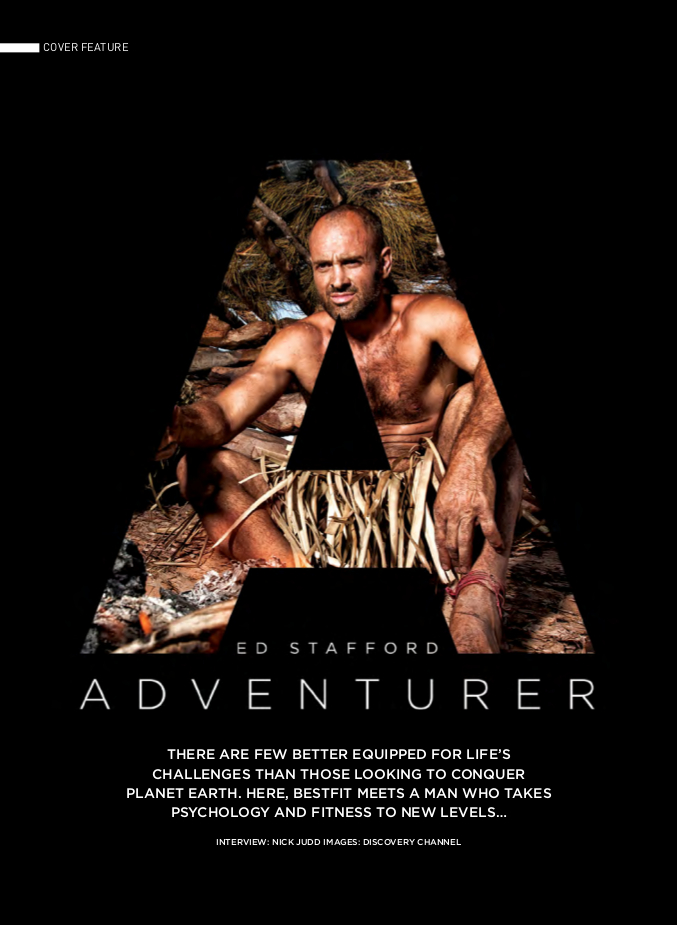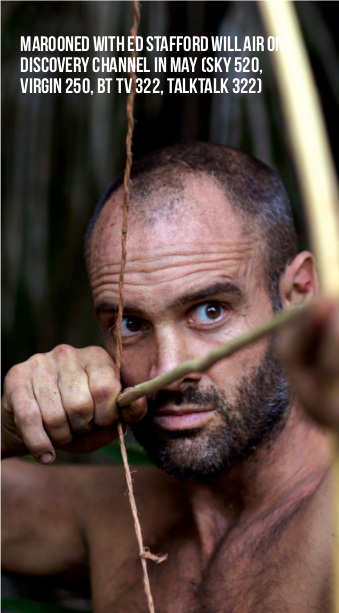BESTFIT Issue 20 – Ed Stafford
BESTFIT Issue 20 – Ed Stafford
Share

It’s ironic, given adventurer Ed Stafford spends most of the time trying to survive without mod-cons ‘at work’, that his coffee machine breaks while in the comfort of his own home.
This fact is not lost on the 39-year-old, who has just spent two weeks in the Philippines for the latest series of Marooned, and who now finds himself chatting to BESTFIT. Marooned sees Stafford dumped into what many of us would consider the arse end of nowhere, remote jungles, for example, and where he has to survive on his wits. Not surprisingly, for a man who has come through being held at gunpoint and been wrongly arrested for murder, among other things, Stafford treats his latest predicament with a wry laugh.
If you’re not familiar with his work, Stafford is the only man to have walked the entire length of the Amazon river. Ever. It took him two and half years, but it got him a place in the Guinness Book of Records. Since then, he’s filmed a series of survivor programmes for the Discovery Channel. First came Naked and Marooned, which involved him having to survive for 60 days on his own in a number of uninhabitable locations. Then came Into the Unknown, where Stafford travelled to remote locations to investigate strange and inexplicable land markings. With Marooned set to return to our screens, we quizzed Stafford on his seemingly herculean levels of physical and mental toughness.
“I was held up at gunpoint three times, arrow point twice and arrested for murder. I was locked up for drug dealing and at one point, I was in Brazil illegally”
You’ve just finished filming your latest trip. what can we expect?
Yep, I spent two weeks in the Philippines for Marooned and then two weeks with my fiancé, who is trying to cross South America by bike with no money. She left Ecuador two months ago and I joined her in Peru for a bit. It was two weeks of survival followed by two weeks of begging for food!
Marooned has evolved organically since the last series. I was briefed to produce six episodes similar to the last series and even though I worked with the same production company, it’s less about me beating my chest to prove I can survive, and instead it’s more philosophical. It still has all the survival stuff, so lighting fires and things, but there’s more contemplative stuff. I think in the last series I was slightly struggling mentally. I had to go into therapy after coming off one island because the experience took me so close to the doors of madness, so this one is a bit lighter!
You’ve almost answered our next question then… so you have come close to loosing your mind while in isolation?
I had someone with me in the Amazon, a friend of mine called Cho, who kept me sane on that occasion.
On that trip it was more a case of cultural isolation, because I was away from home for two and half years, but there was a lot of self-evaluation.
When I left the military, introspection was probably a million miles away from my radar and I was quite a confident person who thought I could do anything. But sometimes it’s good to stop and take stock of yourself and where you are in life. Most people go for a nice walk to reset themselves, I decided to go on a two-and-half year walk! I didn’t know much about psychology then, and a lot of stuff came to the surface that I didn’t really know how to deal with.
The 60-day isolations since have been the most intense thing I can imagine anyone doing. It’s a bit like a mirror; if you’ve got nothing to hide, being on a tropical island on your own would probably be fun. But if, like me, you’ve tried escaping your problems, then it can open a can of worms. I’ve had a lot of difficult years since those experiences, really dealing with a lot of my character traits, but I’m in a very strong mental position now. It’s now quite fashionable to go on a retreat break, and I would wholeheartedly endorse them because it’s a positive thing to do.
Do you train your mind? Meditation? Yoga?
I have to. The survival experiences now last ten days instead of 60, but they’re still stressful. I’ve not been to any of these locations before and that can be daunting, so keeping myself physically fit is only half the battle. I need to be calm to be able to see the survival opportunities around me and hold my own hand through certain situations. A lot of people from my military background would scoff at me for that, but I think it makes you stronger. I meditate most days for 30 minutes a day. When I’m away, it’ll be three times a day just to try and reset myself. I’m confident I can survive anywhere, which is reassuring… my safety net.
You’ve met all kinds of people and tribes. Who are the fittest? And smartest?
I don’t think I’ve met the fittest yet, but I know there are some tribes of sand-bushmen out there who still have all their skills. There’s also a tribe in Mexico who are ultra runners. Once a year, they have a party where they get hammered on low-alcohol beer for 48 hours; basically anything goes. Once the party is over, they do a 104-mile run up and down the mountains.
I’d love to do a series on them, and on endurance in general. I think there are a lot of similarities between what we consider western dietary ‘advancements’ and the stuff these tribes have been doing for years. Unfortunately, a lot of the indigenous people I spend time with have lost their way a little bit; the young guys are less keen to learn the historic tribal ways.
We can see you’re now in peak condition these days, but that wasn’t quite the case when you took on the Amazon, was it?
I fluctuate a lot and I’m no athlete, and it’s probably fair to say that in the four months leading into that Amazon trip I didn’t train as much as I should have done. I’d worked hard to save money for the trip and spent more time planning it than doing any training. And with money in the bank and no inherent ties at that time of my life, I would drink more than I should have done, too. The drinking actually helped with the worry about what we were to embark on, but looking back I started with a bit of a double chin… not ideal. Equally, I knew it wasn’t an Olympic event and I knew I’d become conditioned after a couple of weeks.
Judging by your social media accounts you take your fitness and nutrition a lot more seriously now…
I’ve come full circle now. I’ve spent a lot of time doing callisthenics until recently, but there’s an expedition I’m doing in January, which requires me to become fat-adapted, so less reliant on carbs.
The next few months will be less about high-intensity training and more about building a strong aerobic base. I’ll still do stressful sessions, but they’ll be intermittent around building up a strong aerobic base. I can’t really say much more than that about the expedition, but it’s never been done before and I’m hoping it can be done with a complete overhaul of my nutrition and training.
You must lose a lot of muscle on these expeditions, given that you can’t eat what you need. How do you stay in shape?
It’s very difficult to maintain a constant level of health. Essentially, I go through various stages where it’s difficult to eat well, from flying around the world, to various survival situations, where there are all sorts of physical demands. I’ve tried to take on an exercise regime that works wherever I am, which does include callisthenics, and which I can do anywhere and without any equipment. That keeps me strong enough to be able to do what I do.
You must have so much time when you’re on your own. Do you end up doing endless press-ups?
I would if I had a constant supply of food, but obviously that goes out of the window. You have to go into this starvation/ malnourished mode and that can involve feelings of apathy because the body tries to conserve energy. That inevitably means wanting to sit down and do absolutely nothing, but by day five I’m normally though that and doing press-ups and chin ups (on trees).
You’ve faced hippos, drug traffickers… what’s the most scared you’ve been?
I feel worse doing expeditions than I do the current type of survival work. Even though I’m in isolation, I always know the place I’m going to is safe. I know there’s going to be a supply of fresh water somewhere, and that I’ll be able to find it. We pick places we know are safe. In saying that, I have had encounters with hippos and elephants, but I’ve never felt that my life was in danger.
In Walking the Amazon, I was held up at gunpoint three times, arrow point twice and arrested for murder. I was locked up for drug dealing and at one point, in Brazil, I was in the country illegally due to Visa reasons. Cho, who travelled with me, used to run cocaine up and down the mountains and so he knew which places were dangerous, but even he has since told me that we stumbled into one or two drug processing plants that he can’t believe we emerged from without being killed. All of that felt a lot more dangerous than the stuff I’m doing now!
Also, when I did the Amazon trek, I didn’t have the support of the Discovery Channel that I do now, and all of the assurances that come with that. Had I gone missing at one of the drugprocessing plants in Peru, for example, we would have disappeared off the face of the earth. Now I have a big machine behind me, and that includes an emergency telephone and stuff. The risks are minimized. If the TV company sent me to my death it probably wouldn’t look very good.
You must have people chucking ludicrous challenges at you all the time?
I’m up for doing anything if it’s exciting and challenging, and I think it’s possible. The motivation is different nowadays. I’m
40 this year, so it’s a bit less about my ego! I still want to take on challenges that enable me to see the world, keep learning and which keep me humble. I don’t want a job behind a desk. I must say there are some things on the table at the moment that are a lot riskier than the things I’ve done before. I’m not a thrill seeker, but when things intensify with danger it does interest me! If you psychoanalyse that, it’s probably a fault. I think there’s an element of recklessness in it. Most mature adults would think that while these challenges sound fun they would turn them down.
Do you ever crave normality?
Normal life is more and more appealing. I’ve just bought a house, an old house, and it needs loads of work. I’d like kids, too, so having a family and doing that kind of domestic stuff excites me a lot. That doesn’t mean I’ll change my career, but life’s a balance, isn’t it?














FOLLOW BESTFIT